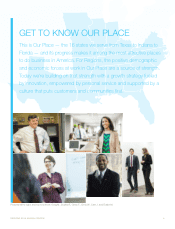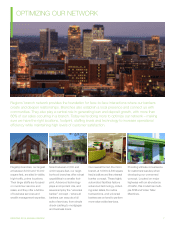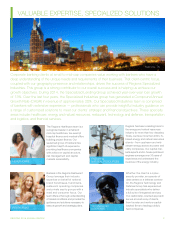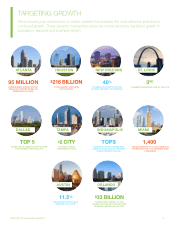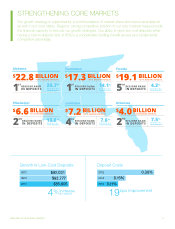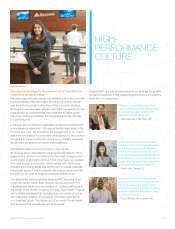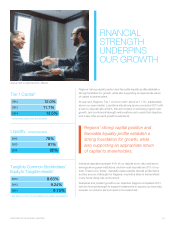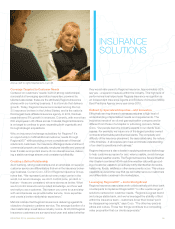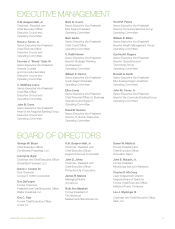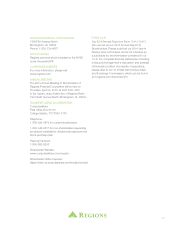Regions Bank 2014 Annual Report Download - page 16
Download and view the complete annual report
Please find page 16 of the 2014 Regions Bank annual report below. You can navigate through the pages in the report by either clicking on the pages listed below, or by using the keyword search tool below to find specific information within the annual report.
15 REGIONS 2014 ANNUAL REVIEW
A STRONGER
TEAM
Our Strong Team Keeps Getting Stronger
At Regions, creating value for all of our stakeholders and achieving
top-tier performance depends upon the dedication and strength of
more than 23,000 associates. Recruiting, developing and retaining
associates to build the best team is a core strategic priority. Today,
our diverse, inclusive and empowering workplace is attracting
some of the strongest talent in the industry. We’re also doing more
to invest in our human capital and strengthen engagement across
all of the organization’s functional areas and geographies.
Investing in Talent Development
When associates join Regions, they are provided with training and
development to quickly become oriented with the complexities of
banking. Throughout an associate’s career, various types of training
are available where the curriculum is designed to strengthen their
skills. Individual training experiences are also available that focus on
leadership development, which may last six to nine months. These
and other development programs emphasize active learning, peer
interaction and a healthy dose of regular self-assessment.
Investing in our associates also comes as part of our annual talent
management evaluations, where some 4,200 managers are
assessed on their leadership competencies – to identify associates’
potential and possible career progression. Regions also utilizes tools
to help associates identify their own particular strengths, which helps
to pinpoint areas where an associate demonstrates exceptional skills
or ability. These assessments give associates insight into themselves
and provide education about how to leverage those skills to
increase opportunities for advancement.
A Compelling Career Opportunity
From top graduates at leading universities to proven performers
from the financial industry, premier talent is choosing a career at
Regions because of our unique, compelling culture. The Regions
workplace environment is collegial and team-oriented, and the
opportunities for growth are significant. For new hires, our signature
leadership development initiative is the Management Associate
(MA) program, reserved for the most promising recruits from
colleges and universities and the U.S. military. This important
and long-standing program has been part of the bank’s training
program for more than 50 years. The program is comprehensive
and demanding and leverages training insights from senior
Regions management. MA graduates can be found in some of
the most important leadership roles throughout every level of
the Regions organization, including current Chairman, President
and Chief Executive Officer Grayson Hall.
Meeting our business objectives also requires that we onboard
leaders with extensive industry experience. In 2014, we were suc-
cessful in attracting impressive candidates in critical functional areas,
including specialized lending and wealth management, and opera-
tional functions such as audit, compliance and risk management.
According to Dave Keenan, Regions Director of Human
Resources, “We are able to attract the best because we offer a
work environment where people care about one another and
their success. For some experienced bankers who have joined
us, it’s getting back to banking the way they remembered it
years ago. At Regions, they can see the fruits of their labor and
they have the ability to control and influence outcomes.”
Strategies to Strengthen Engagement
Along with key organization performance results – financial, risk,
credit and service quality – we employ associate engagement
as a key metric to measure our success in building the best team.
Since the initial benchmark study of associate engagement in
2012, we have recorded significant gains in associate engagement.
Managers are now assessed on the engagement of their direct
reports, and impact planning meetings are held to map future
goals and progress. By opening lines of communication, over-
coming systemic barriers to getting the job done and promoting an
environment of transparent communication where every associate
feels they have a voice, we are on track to continue to strengthen our
level of associate engagement.
Above: (left to right) Kara J., Steve P.



